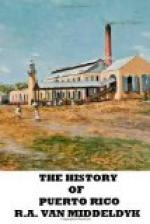Of the rest seven were condemned to death, but the governor pardoned five. The remaining two were pardoned by his successor.
So ended the insurrection of Lares. During the trial of the rebels, the same members of the reform party who had been banished by Governor Marchessi, Don Julian Blanco, Don Jose Julian Acosta, Don Pedro Goico, Don Rufino Goenaga, and Don Calixto Romero, were denounced as the leaders of the Separatist movement. They were imprisoned, but were soon after found to have been falsely accused and liberated.
[Illustration: Only remaining gate of the city wall, San Juan.]
Until the arrival of General Don Gabriel Baldrich as governor (May, 1870), Puerto Rico benefited little by the revolution of September, 1868. The insurrection in Cuba, which coincided with the movement in Lares, made Sanz, the successor of Pavia, a man of arbitrary character and reactionary principles, adopt a policy more suspicious and intransigent than ever (from 1869 to 1870), but Governor Baldrich was a staunch Liberal, and the Separatist phantom which had haunted his predecessor had no terrors for him. From the day of his arrival, the dense atmosphere of obstruction, distrust, and jealousy in which the island was suffocating cleared. The rumors of conspiracies ceased, political opinions were respected, the Liberals could publicly express their desire for reform without being subjected to insult and persecution. The gag was removed from the mouth of the press and each party had its proper organ. The municipal elections came off peaceably, and the Provincial Deputation, composed entirely of Liberal reformists, was inaugurated April 1, 1871.
General Baldrich was terribly harassed by the intransigents here and in the Peninsula. He was accused of being an enemy of Spain and of protecting the Separatists. Meetings were held denouncing his administration, menaces of expulsion were uttered, and he was insulted even in his own palace. Violent opposition to his reform measures were carried to such an extent that he was at last obliged to declare the capital in a state of siege (July 26, 1871).
On September 27th of the same year he left Puerto Rico disgusted, much to the regret of the enlightened part of the population, which had, for the first time, enjoyed for a short period the benefits of political freedom. As a proof of the disposition of the majority of the people they had elected eighteen Liberal reformists as Deputies to Cortes out of the nineteen that corresponded to the island.
Baldrich’s successor was General Ramon Gomez Pulido, nicknamed “coco seco” (dried coconut) on account of his shriveled appearance. Although appointed by a Radical Ministry, he inaugurated a reactionary policy. He ordered new elections to be held at once, and soon filled the prisons of the island with Liberal reformists. He was followed by General Don Simon de la Torre (1872). His reform measures met with still fiercer opposition than that which




